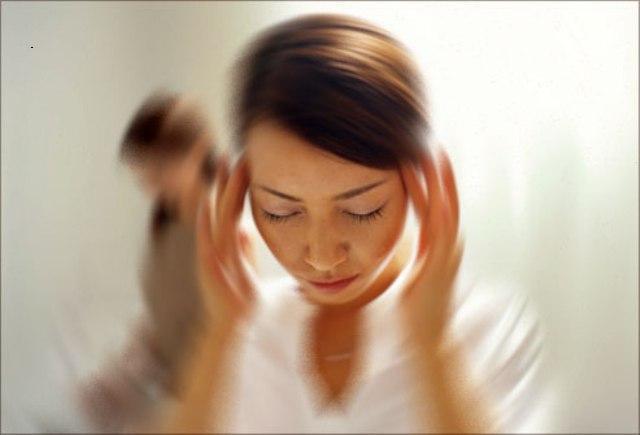Do you often have a headache that makes you feel dizzy? It could be migraine or something else. Headaches can be quite unsettling, but things become even more difficult when you have a headache along with dizziness. It is important to talk to your doctor who will examine you carefully to identify the cause of your dizziness. Keep reading to learn more about what may cause headache and dizziness in your case.

Headache and Dizziness, What Can It Be?
There are certain conditions can make headache associated with dizziness. Some common ones are listed below. Check out if your case is included.
1. Migraines
If you experience severe headache with a sense of instability, you may have migraine. This sometimes also happen due to the dysfunction of the balance organ in your ear and how your brain processes that information. Any imbalance may cause the spinning sensation of vertigo. If you experience dizziness without the headache pain, it may indicate that you have headache-free migraine.
2. Traumatic Brain Injury
You may experience headache along with dizziness after you sustain a brain injury caused by a blow to the head or other events. You may also experience fatigue with this type of headaches.
3. Low Blood Sugar
If you are experiencing headache and dizziness with other symptoms such as sweating, hunger, and trembling, you may have low blood sugar. This happens when there are several hours break between meals. You should consider eating small, frequent meals to manage your blood sugar levels better.
4. Change in Blood Pressure
Both high blood pressure and low blood pressure can causedizziness and headache with other symptoms such as nausea and blurred vision. You may have postural hypotension or low blood pressure if you feel dizzy when you stand up suddenly.
5. Infections—Labyrinthitis
Dizziness with headache is one common symptom of an acute systemic infection, such as flu. You may also experience other symptoms such as fatigue, chills, high fever, nausea and lack of appetite. You are more likely to experience headache and dizziness with localized infections of the head such as ear infections, meningitis, encephalitis, etc.
To be specific, labyrinthitis is basically an ear infection inside your ear, causing symptoms such as hearing loss, dizziness, ear pain, mild headaches, pus discharge and humming in your ear, etc. You may also notice changes in vision with a feeling of pressure inside your ear.
6. Menopause
For female who are in menopause, you may also experience this issue. A change in body's estrogen levels after menopause may cause headache and dizziness. The menopause headaches become worse with estrogen level coming down. When the hormones fluctuate, you usually experience spells of dizziness.
7. Other Factors
Aside from the above conditions, some other factors can make you feel dizzy and headache. For instance, diet including aged cheeses, caffeine, alcohol, aspartame, chocolate, and monosodium glutamate. Similarly, stress can cause and aggravate your migraines and headaches. Hormonal changes due to contraceptivesmay worsen your headaches.
How to Relieve Headache and Dizziness
In some cases, these sensations may also indicate a more serious medical condition. It is therefore a good idea to talk to your doctor and tell them about your symptoms for proper diagnosis. Here are some steps to manage some common triggers of headaches and dizziness.
1. Treat the Infection
Labyrinthitis, as one common infection that can cause headache and dizziness, you need to take plenty of rest as well as some medication to get relief; usually you can expect some improvement within a few weeks. Your doctor may prescribe antibiotics if an infection develops. Contact your doctor if symptoms persist for three weeks. You may require a more intensive treatment such as vestibular rehabilitation therapy if your symptoms persist for several months.
2. Manage Blood Sugar Levels
Eat something immediately if you have low blood sugar, like fruit juice or even take dextrose tablets. After eating some sugar stuff, you should have a carbohydrate rich food such as a few biscuits or a sandwich to correct your blood sugar. You may be given an injection containing glucagon if you become unconscious due to low blood sugar. Remember, never put drink or food into the mouth of anyone who is feeling drowsy or is unconscious.
3. Deal with Menopause Discomforts
As one of the triggers of headache and dizziness, you need to deal with menopause discomforts to get relief. Sticking to a balanced diet will help a lot in regulating hormone levels and prevent menopause related headaches. You should also try to eat more often after menopause to prevent dizziness. Include soy in your diet because it contains phytoestrogens that help a lot in restoring estrogen levels in your body.
4. Take Medicines
There are migraine medications but they do not work for everyone. You can however try abortive medications such as naproxen, ibuprofen, or Tylenol along with prescriptive drugs such as rizatriptan and sumatriptan. Your doctor may also prescribe preventive drugs such as topiramate and amitriptyline.
Sometimes, complementary therapies are recommended by the doctor, such as acupuncture and biofeedback to reduce stress levels and correct problem, such as dizziness, pain, and vertigo. Magnetic stimulation may also work in some cases, which involves placing a prescription device on the back of your head after you have a migraine.
5. Make Lifestyle Changes
You can make your headache and dizziness more manageable by making some changes in your lifestyle. For starters, avoid trigger foods such as peanuts, chocolate, and red wine. Meditate to reduce stress, stop smoking, and exercise regularly to prevent migraine attacks.
